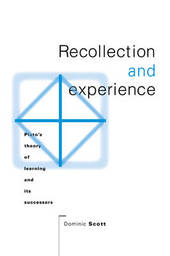
|
Recollection and Experience: Plato's Theory of Learning and its Successors
Paperback / softback
Main Details
| Title |
Recollection and Experience: Plato's Theory of Learning and its Successors
|
| Authors and Contributors |
By (author) Dominic Scott
|
| Physical Properties |
| Format:Paperback / softback | | Pages:300 | | Dimensions(mm): Height 228,Width 152 |
|
| Category/Genre | Western philosophy - Ancient to c 500 |
|---|
| ISBN/Barcode |
9780521030915
|
| Classifications | Dewey:184 |
|---|
| Audience | | Professional & Vocational | |
|---|
| Illustrations |
Worked examples or Exercises
|
|
Publishing Details |
| Publisher |
Cambridge University Press
|
| Imprint |
Cambridge University Press
|
| Publication Date |
18 January 2007 |
| Publication Country |
United Kingdom
|
Description
Questions about learning and discovery have fascinated philosophers from Plato onwards. Does the mind bring innate resources of its own to the process of learning or does it rely wholly upon experience? Plato was the first philosopher to give an innatist response to this question and in doing so was to provoke the other major philosophers of ancient Greece to give their own rival explanations of learning. This book examines these theories of learning in relation to each other. It presents an entirely different interpretation of the theory of recollection which also changes the way we understand the development of ancient philosophy after Plato. The final section of the book compares ancient theories of learning with the seventeenth-century debate about innate ideas, and finds that the relation between the two periods is far more interesting and complete than is usually supposed.
Reviews"Scott argues skillfully... A stirring conclusion..." International Studies in Philosophy "The breadth of the discussion is quite great. It will behoove anyone interested in the notion of innateness to look at this book." Allen Silverman, Bryn Mawr Classical Review "Dominic Scott's Recollection and Experience reminds us all of the richness of ancient philosophy and its legacy on the subsequent history of philosophy, particularly the 17th century." David Glidden, Ancient Philosophy
|